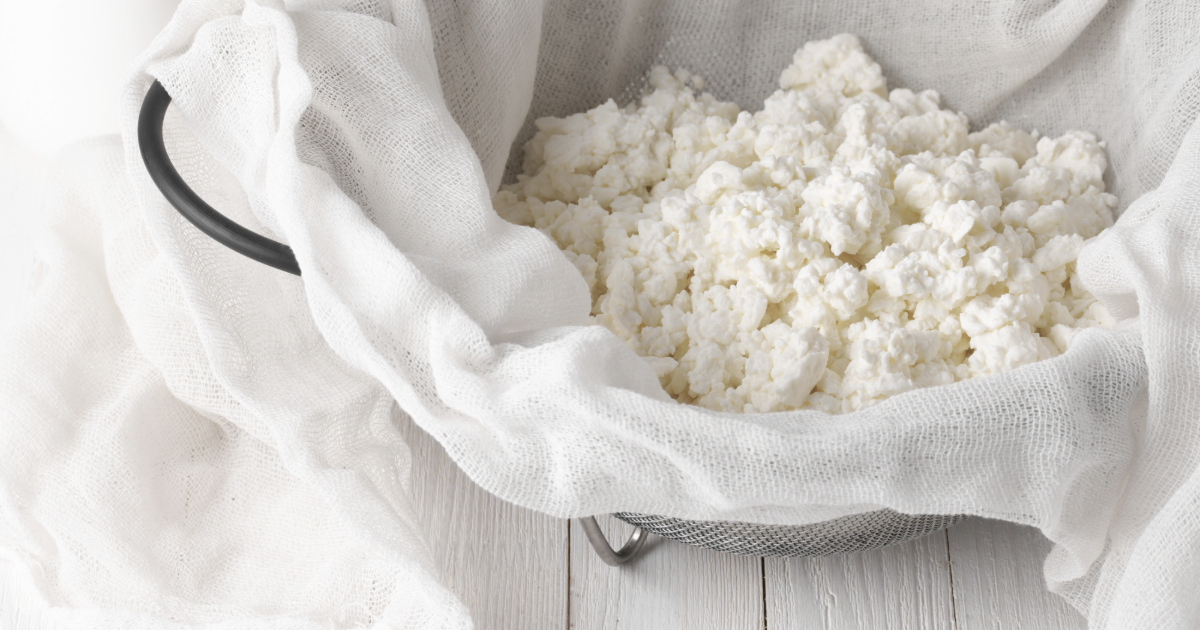Cheesecloth is a versatile kitchen tool used for straining, wrapping, and storing foods.

But what if you don't have any cheesecloth on hand when a recipe calls for it?
Luckily, there are plenty of household items that work nicely as cheesecloth substitutes.
What to Look for in a Cheesecloth Substitute
When picking a cheesecloth stand-in, there are a few key things to keep in mind:
- Breathability: Cheesecloth is lightweight and airy, allowing moisture to evaporate while still protecting food. Any substitute should have a loose, porous weave.
- Strainability: The tiny holes in cheesecloth allow liquid to pass through while catching solids. Replacements should be thin but not too tight.
- Cleanliness: Make sure anything touching food hasn't been treated with harsh chemicals or dyes. Stick to plain, undyed natural fabrics.
- Reusability: Cheesecloth can typically be reused, so reusable substitutes are ideal over single-use disposable options.
15 Handy Cheesecloth Substitutes Already at Home
1. Coffee Filters
Coffee filters are an excellent cheesecloth substitute as their tight weave strains liquids beautifully. Just be patient when pouring since it takes longer than with cheesecloth. Rinse before returning to the coffee maker!
Key Takeaway: Coffee filters work well for straining but take longer than cheesecloth.
2. Paper Towels
Paper towels aren't as durable as cheesecloth but can drain liquid if gravity does the work. Place over a strainer and account for some absorption. Avoid cheap brands that may fall apart.
3. Fine Mesh Bags
Reusable mesh produce bags catch solids when straining liquids, great for broths, cheeses and nut milks. Use cotton bags only, not plastic which could melt. These also make herb bundles for seasoning stocks.
4. Clean Socks
Thin, airy socks surprisingly substitute cheesecloth for straining, dusting powdered sugar, or even wiping windows! Stick to new or freshly laundered socks only. Mismatched ones work for household cleaning and dusting.
5. Cotton T-Shirts
A surprising cheesecloth stand-in is the common cotton tee! Use to wrap turkeys or chickens and help them stay moist while roasting. The material also strains soft cheese curds when making ricotta or cottage cheese.
6. Lightweight Terry Towels
Thin, lint-free kitchen towels like flour sack towels or tea towels have the breathable cotton weave needed to drain soft cheeses. Avoid thicker terry cloth towels that could transfer lint. White is best!
7. Nut Milk Bags
These nylon or cotton bags catch pulp when making nut milks. Bonus - don't throw that pulp away, transform into meals instead! Nut milk bags also work for straining yogurt to make Greek yogurt or cheese like ricotta.
Key Takeaway: Nut milk bags catch pulp and work similarly to cheesecloth when straining.
8. Handkerchiefs
A clean cotton hanky substitutes for cheesecloth when making cheese or strains broths nicely. Launder first and avoid dyed fabrics to prevent colors from bleeding into food. Handkerchiefs are washable and reusable too!
9. Muslin Blankets
The lightweight gauze of some muslin makes it nearly identical to cheesecloth. Use to wrap pork roasts or even fruit cakes while aging to retain moisture and shape. Muslin gets softer over time and washes easily.
10. Medical Gauze
Sterile cotton gauze from first aid kits resembles cheesecloth. It's thinner so double up layers when straining. Works well for spice sachets in soups and stocks too. Just restock the kit after!
Key Takeaway: Medical gauze stands in for cheesecloth but use a double layer since it's thinner.
11. Sheer Pantyhose
Pantyhose make surprisingly handy cheesecloth substitutes! Use the foot as a sifter for dusting powdered sugar over pastries. Or stretch the hose over a bowl to make a strainer. When done - toss in the wash to reuse.
12. Tea Infuser
Metal tea balls enclose loose leaf tea, keeping it together perfectly during steeping. Use the same idea with spices and herbs by filling the infuser and dropping into broths, stews or mulled ciders. Easy removal when done too!
13. Fine Wire Mesh Sifter
Sieves allow smaller particles through than cheesecloth. But for recipes just needing a coarse strain, a fine mesh sieve gets the job done well. Won't catch all solids but still strains effectively.
14. Tightly Woven Cotton
Check your stash of crafty cottons or old linens for a suitable cheesecloth substitute. Bandanas, napkins, diapers, fabric scraps, etc work if tightly woven cotton or linen. White is best. Weave impacts filtering ability so test a small batch first.
15. Unbleached Coffee Filters
Either bleached or unbleached cone filters fit most home brewers. Both make good substitutions in cooking and cleaning uses, but unbleached is best for food handling. These catch fine sediment when straining liquids. Rinse first - avoid soap.
FAQs
Can I use paper towels as cheesecloth?
Yes, you can use paper towels in a pinch but they won't be as durable. Place them in a strainer and allow gravity to pull the liquid through. Expect some absorption of moisture.
What household item works best as cheesecloth?
Coffee filters and lightweight cotton towels or t-shirts tend to work best. Items should have breathable, finely woven fabric that catches particles but still lets liquid through when straining.
Can I use a coffee filter instead of cheesecloth?
Coffee filters allow liquid to pass through slowly while trapping solids, making them an easy cheesecloth swap. Their tight weave takes longer than cheesecloth though, so go slow.
Can you reuse substitutes for cheesecloth?
Choose reusable substitutes over paper towels or coffee filters whenever possible. Tea towels, T-shirts, mesh bags and other washable fabrics can be reused again and again. Some may wear our faster than actual cheesecloth though.
Conclusion
Cheesecloth is handy but not a necessity. Odds are you have useful substitutes already at home like reusable mesh bags, coffee filters, cotton T-shirts or towels.
When selecting a stand-in, opt for breathable, plain-woven natural fabrics over treated textiles or synthetics.

